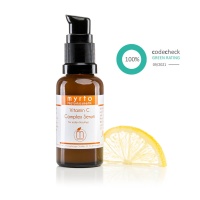How does the skin change during pregnancy?
Hormonal changes
Pregnancy is often considered a high point in a woman's life as it is a time of particularly intense physical and emotional experiences. Pregnancy, which lasts around 40 weeks, involves many changes in the female body. This not only affects the visible abdominal circumference, which grows with each week of pregnancy. The main determining factor for the pregnancy-related changes is the increase in estrogen and progesterone levels.
Baby glow
Many women expecting a baby find that their skin looks rosier, firmer and more radiant during pregnancy, so small wrinkles disappear. That “baby glow” is related to increased blood circulation, slightly increased sebum production and increased hormone production.
Skin problems during pregnancy
- Itching, redness or intolerance
Sometimes skin problems such as dry, oily, irritated skin or pregnancy acne occur during pregnancy. The skin of an expectant mother can react more sensitively - with unusual itching, redness or intolerance to care products that have not previously caused any problems for the skin for years - Pregnancy acne
While some pregnant women even experience acne disappearing, in some women the hormonal changes can also increase blemishes, blackheads and pimples or make acne worse (Pregnancy acne). Women who have already had skin problems with pimples tend to be more likely to struggle with pregnancy acne. - Stretch marks on the stomach
The rapid growth of the stomach, which becomes more and more visible after the 5th month, places the highest demands on the elasticity of the skin. The connective tissue can easily become overstretched or even tear. Stretch marks can occur especially on the stomach, but also on the breasts, hips and thighs. These stretch marks often start as bluish-reddish lines that fade over time. Stretch marks are a normal skin condition that affects many women. They can be concealed with makeup and self-tanner or simply compensated for with natural self-confidence. - Hyperpigmentation: Pregnancy mask
In the last trimester of pregnancy, the melanocyte-stimulating hormone (MSH) causes visible hyperpigmentation in the midline area of the abdomen, on the breasts. stents and genitals. Large, dark pigment spots can also form on the face. The so-called “pregnancy mask”, “Chloasma” or “Melasma Gravidarum” is caused by the increased estrogen level, which stimulates melanin production. Typically, the pregnancy mask will fade some time after the baby is born as hormone levels return to normal. This may require some patience and sometimes gentle lightening ingredients to support.
Don'ts: Active ingredients you should avoid during pregnancy
The following list contains cosmetic actives that are not generally considered harmful, but should better be avoided or replaced during pregnancy. The list is of course not complete, as most cosmetic products contain a variety of potentially harmful ingredients such as parabens, paraffins, mineral oils, aluminum salts, microplastic particles, phthalates, formaldehyde and other skin-irritating or hormonally active ingredients. It's best to check every single product in your skin care routine - for example with the help of the Codecheck app or via hautschutzengel.de.
- Retinol
Retinol is one of the synthetic vitamin A derivatives. Retinol is a skin-firming, cell-renewing, anti-aging and anti-inflammatory anti-acne active ingredient, which, however, causes severe skin irritation even in small overdoses. Retinol is administered orally as tretinoin (retinoic acid) for severe acne. You can find retinoids in cosmetics, for example as retinoic acid, retinaldehyde, adapalene, isoretinoin or retinyl palmitate. You should definitely avoid retinoids during pregnancy as they can lead to malformations in the embryo. As an alternative to synthetic retinol, there are some active ingredients with similar benefits for the skin - without any risks for the unborn baby. - Salicylic acid
Salicylic acid is a beta-hydroxy acid (BHA) and is primarily used in peelings for pimples and acne to improve the complexion. According to the EU Cosmetics Regulation, a maximum of 0.5% salicylic acid is permitted for preservation, 3% in rinse-off products and a maximum of 2% in cosmetics that are not rinsed off (leave-in). At higher doses, such as those used in dermatological practices, salicylic acid can enter the bloodstream and increase the risk of abnormal development for the unborn child. - Benzoyl peroxide
Benzoyl peroxide has an antibacterial and anti-inflammatory effect. The active ingredient, produced synthetically from benzoyl chloride and hydrogen peroxide, is used to treat acne. Possible side effects include redness, dryness, scaling, and burning. Benzoyl peroxide should be avoided during pregnancy as its safety has not been established. - Hydroquinone
Hydroquinone is produced synthetically as a derivative of benzene, has a skin-bleaching effect and is used to treat hyperpigmentation. There are concerns about its safety during pregnancy, particularly when taken orally.
Dos: Recommended alternative actives for pregnancy
The following actives are good alternatives to retinol, salicylic acid, benzoyl peroxide and hydroquinone, as they are also recommended for application during pregnancy:
-
Bakuchiol
Bakuchiol as a purely plant-based active ingredient from the Babchi plant, it has similar skin-improving properties as retinol, including antimicrobial effects against pimples and acne, improved collagen production and the reduction of fine lines and wrinkles - but without the potentially teratogenic properties of retinol.
-
Vitamin C
Vitamin C as an effective antioxidant stimulates collagen production and protects the skin from damage caused by free radicals. The natural vitamin C derivative we use (ascorbyl glucoside) has a gently brightening effect on hyperpigmentation and ensures a more even complexion.
-
Niacinamide (Vitamin B3)
Niacinamide is effective against acne, hyperpigmentation and enlarged pores. Thanks to its antioxidant properties, niacinamide protects against cell damage caused by free radicals, for example against sun damage caused by UV radiation. It also counteracts skin aging.
-
Willow bark extract, lactic acid, glycolic acid
Alternative natural active ingredients for a skin-friendly, slightly peeling effect during pregnancy include moderately dosed Willow bark extract (Salix Alba Extract) below 2%, as well as exfoliating alpha hydroxy acids (AHA) such as lactic acid or glycolic acid, which provide a gentler exfoliation to remove dead skin cells and improve the skin texture.
How can you prevent stretch marks during pregnancy?
-
Massages
Massages with moisturizing creams or oils improve blood circulation, promote the removal of waste products through the lymph and help to keep your skin elastic.
-
Healthy diet
A diet rich in vital nutrients and fresh food supports your skin health. During pregnancy, pay particular attention to sufficient intake of vitamin C, vitamin E, iron, zinc and proteins. -
Controlled weight gain
Try to achieve a healthy but moderate weight gain during pregnancy so that your skin doesn't become overstretched. Slow and steady weight gain reduces the risk of stretch marks. - Clothing
To reduce pressure on the skin and minimize the risk of stretch marks, you should wear clothing that is as loose as possible. - Exercise
Regular exercise promotes blood circulation and supports skin health. Pregnancy exercises and yoga are particularly useful – also with regard to conscious breathing during birth. - Moisturizing creams and oils
Regularly moisturize the skin on your stomach, breasts, thighs and other areas that may be affected by stretch marks. ig one. High-quality organic plant oils, fats and waxes such as jojoba, argan, grape seed oil and shea butter are particularly well tolerated by the skin. The skin-neutral myrto recipes without alcohol, emulsifiers, fragrances or synthetic preservatives help to strengthen the skin barrier and the natural skin flora (microbiome). All myrto care products such as Organic facial cleanser, Toner, Facial serums and Moisturizing creams, Eye serums, Shampoos and Deodorants can therefore also be used during pregnancy without any problems.











